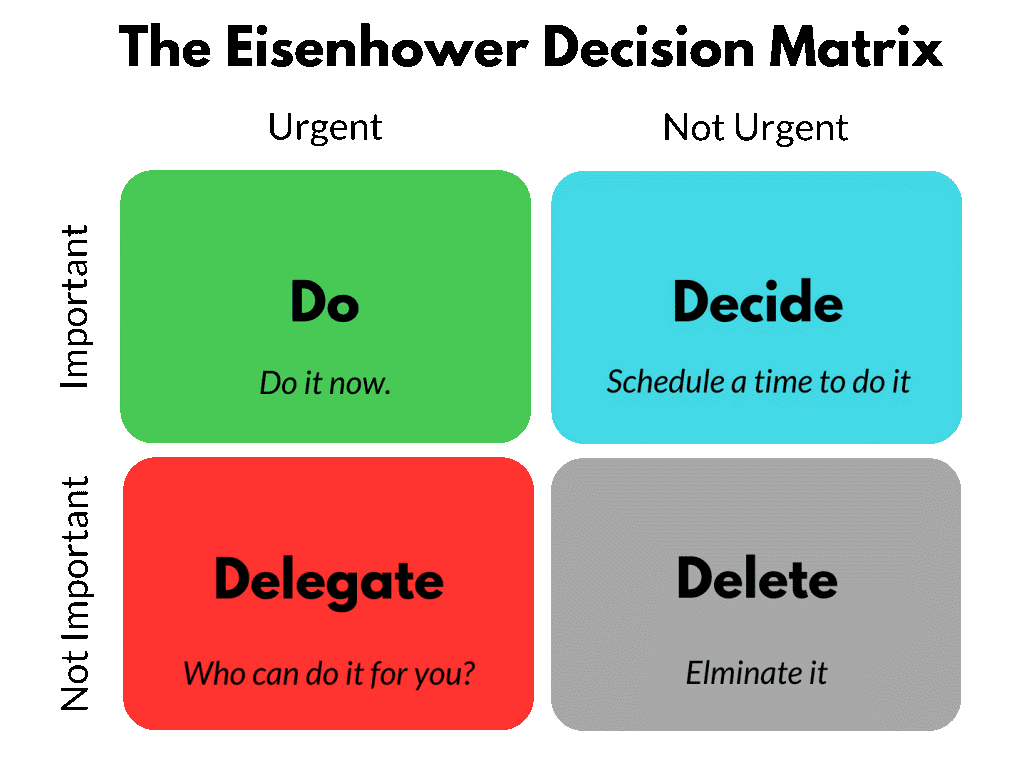Time management is crucial for busy managers and leaders to ensure productivity, efficiency, and effectiveness in their roles.
Here are some key principles of time management tips for busy leaders:

1. Prioritise Tasks: Identify tasks and projects based on their importance and urgency. Use techniques like Eisenhower’s Urgent/Important Matrix to categorise tasks and focus on what truly matters.
2. Set Clear Goals: Establish clear, achievable goals for yourself and your team. Break down larger goals into smaller, actionable tasks with deadlines to keep everyone on track.
3. Plan and Schedule: Allocate specific time slots for tasks and activities in your calendar. Schedule regular time blocks for important tasks, meetings, and strategic thinking. Stick to your schedule as much as possible to avoid distractions and procrastination.
4. Delegate Effectively: Delegate tasks to capable team members to leverage their skills and free up your time for higher-priority activities. Clearly communicate expectations, provide necessary resources, and make time to develop your team to enable them to support you to deliver.
5. Avoid Multitasking: Focus on one task at a time to maintain concentration and quality. Multitasking can lead to decreased productivity and errors. Instead, practice single-tasking and give your full attention to each task before moving on to the next.
6. Use Time Management Tools: Utilise tools and technologies such as calendars, task managers, project management software, and time tracking apps to organise your schedule, set reminders, and track progress.
7. Practice Time Blocking: Dedicate specific time blocks for different types of activities, such as responding to emails, conducting meetings, working on projects, and personal development. This helps create a structured routine and reduces decision fatigue.
8. Minimise Distractions: Identify and minimise distractions in your work environment, whether it’s email notifications, social media notifications on your mobile devices, or interruptions from colleagues. Set boundaries, establish designated focus periods, and create a conducive workspace for concentration.
9. Take Breaks and Rest: Recognise the importance of breaks and downtime for maintaining focus, creativity, and overall well-being. Incorporate short breaks throughout your day to recharge and avoid burnout.
10. Reflect and Adjust: Regularly review your time management strategies and assess what’s working well and what needs improvement. Adjust your approach based on feedback, changing priorities, and lessons learned from past experiences.
By implementing these principles of time management, busy managers can optimise their productivity, achieve their goals, and maintain a healthy work-life balance.
At Flagship Partners we offer both in-person and online Time Management sessions – so get in touch today if you believe this could support you.
Frequently asked questions on Time Management include;
1. Why is time management important?
Time management is important because it allows individuals to prioritise tasks, increase productivity, reduce stress, meet deadlines, and achieve goals effectively.
2. How can I improve my time management skills?
Improving time management skills involves setting clear goals, prioritising tasks, planning and scheduling, avoiding multitasking, delegating effectively, minimising distractions, and practicing self-discipline.
3. What are the common time management challenges?
Common time management challenges include procrastination, difficulty prioritising tasks, overcommitment, interruptions and distractions, lack of delegation, poor planning, and underestimating the time needed for tasks.
4. What are some effective time management techniques?
Effective time management techniques include using to-do lists, setting SMART goals, prioritising tasks using methods like the Eisenhower Matrix, time blocking, Pomodoro Technique (work intervals followed by short breaks), and adopting tools like calendars and task managers.
5. How do I deal with procrastination?
To deal with procrastination, break tasks into smaller, manageable steps, set deadlines, eliminate distractions, create a conducive work environment, use positive reinforcement, and practice self-discipline. It’s also helpful to understand the underlying reasons for procrastination and address them accordingly.
6. How do I balance work and personal life effectively?
Balancing work and personal life involves setting boundaries, prioritising activities, scheduling time for both work and leisure, delegating tasks when necessary, and practicing self-care. It’s important to maintain perspective, communicate openly with colleagues and family, and make time for activities that recharge you.
7. How can I overcome overwhelm from too many tasks?
To overcome overwhelm, prioritise tasks based on importance and urgency, break tasks into smaller steps, focus on one task at a time, delegate tasks when possible, and seek support or guidance from colleagues or mentors. Learning to say no to non-essential commitments can also help manage workload.
8. How do I handle interruptions and distractions?
Handling interruptions and distractions involves setting boundaries, communicating expectations with colleagues, scheduling focused work periods, turning off notifications, creating a distraction-free workspace, and using techniques like the Pomodoro Technique to stay focused.
9. How do I stay motivated and avoid burnout?
To stay motivated and avoid burnout, set meaningful goals, celebrate achievements, maintain work-life balance, take regular breaks, prioritise self-care activities, seek support from colleagues or mentors, and regularly reassess priorities to ensure alignment with personal and professional values.
10. What should I do if my time management strategies are not working?
If your time management strategies are not working, reassess your approach, identify areas for improvement, experiment with different techniques, seek feedback from colleagues or mentors, and consider seeking professional development opportunities or coaching to enhance your skills. Flexibility and willingness to adapt are key to finding effective time management strategies.
